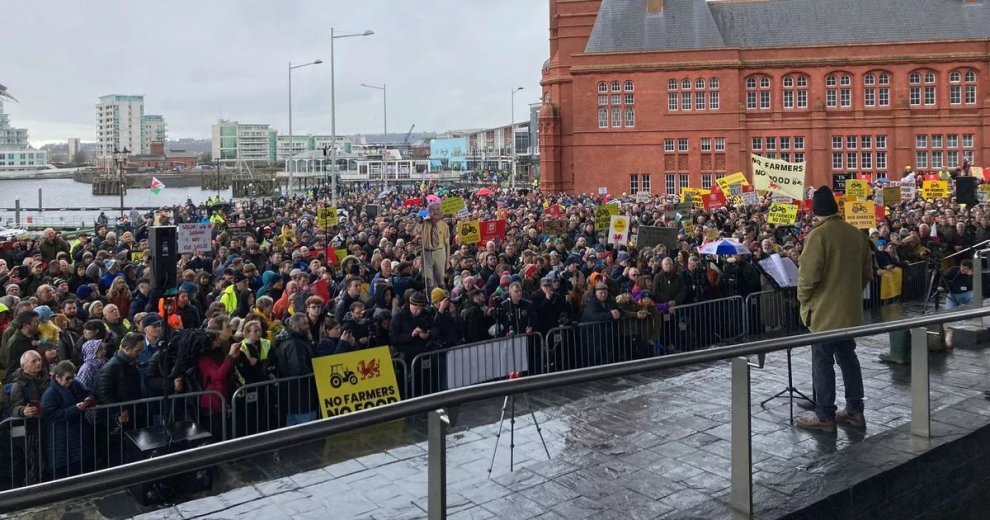POLITICIANS from across the spectrum are appealing for votes from the farming community following recent protests in Wales. While farming policy is largely managed by the Welsh government, decisions on subsidies and trade remain under Westminster’s purview.
Farming and environmental groups are urging parties to commit to significantly higher funding for the sector ahead of the upcoming general election. They are advocating for Wales to receive over £500m annually to support a shift towards greener payments for farmers.
Against the backdrop of bleating sheep and the auctioneer’s gavel at Llanybydder mart in Carmarthenshire, farmers gathered to discuss the forthcoming election. Llyr Davies, 35, expressed the challenges of farming in today’s climate: “It’s tough… trying to provide for three young kids.” He highlighted the disconnect between politicians’ promises and tangible action, stressing the need for substantial financial support.
Lena Evans, 23, echoed concerns about the difficulties facing younger farmers: “People my age trying to take on farms, we’re really struggling.” She emphasised the underestimated workload and the financial pressures exacerbated by rising prices.
Alun Thomas, 52, viewed recent protests as an awakening for politicians regarding rural realities: “It’s a time of uncertainty.” He underscored the need for forward-thinking policies that support agricultural sustainability.
The protests were sparked by the Welsh government’s proposed sustainable farming scheme, which aims to replace EU-era subsidies with payments linked to environmental targets. However, farming unions argued that aspects of the scheme were impractical and could jeopardise jobs.
Prior to the general election announcement, the Welsh government postponed the scheme’s launch by a year and established a new roundtable to address industry concerns. Ministers portrayed this move as responsive to farmer feedback, yet political opponents have seized on the issue for electoral gain.
Ahead of polling day, the Welsh Conservatives launched their campaign on a farm, while Plaid Cymru held a press event at a livestock mart. Elin Jenkins of the Farmers’ Union of Wales noted heightened interest from candidates in engaging with farmers, as parties vie for rural votes.
The primary demand from farming unions is increased funding from Westminster to support agriculture and rural development in Wales. Despite assurances, disputes persist over whether pre-Brexit funding levels have been adequately matched.
In addition to funding, Welsh farming organisations are advocating for equitable trade rules post-Brexit and greater scrutiny of future trade agreements. Environmental groups are calling for a substantial increase in public spending to support nature-friendly farming practices.
Regarding party stances:
- Plaid Cymru emphasises protecting family farms and giving Wales veto power over detrimental trade deals.
- The Welsh Conservatives pledge increased farming investment and inflation-adjusted funding for Welsh farmers.
- Welsh Labour underscores sustainable farming and collaboration with stakeholders to finalise a long-term scheme.
- The Liberal Democrats propose additional spending to support sustainable farming and advocate for renegotiating trade deals.
- The Green Party aims to triple agricultural spending, support local food production, and ensure fair wages for growers.
- Reform UK seeks to boost the farming budget and streamline subsidies to benefit food production directly.
As the election approaches, the debate over the future of Welsh farming intensifies, with parties striving to secure rural support amidst evolving agricultural policies and economic uncertainties.














